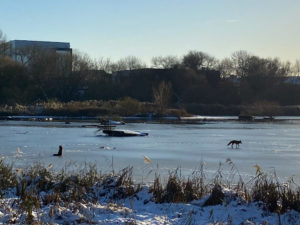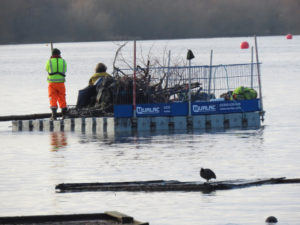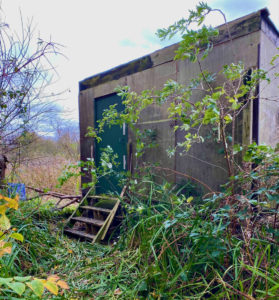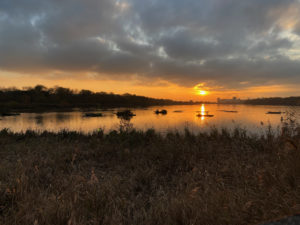As a frozen Brent Reservoir (Welsh Harp) becomes a playground for foxes, Ben Watt looks back across a year of cleanup and campaigning.

December. Like everywhere the first half of the month was dominated by the mighty freeze. Almost the entire reservoir froze over. Waterbirds jostled for space in the few patchy areas of open water near the shoreline. A lot of the action happened near the canoe club. Pochards elbowed out shovelers. Mallards got stroppy. Strapping gulls bathed themselves ostentatiously, ruffling their wings, splashing and flapping, dunking their heads. Coots anxiously milled around. From a distance it looked like one big Miami pool party, only in sub-zero temperatures.
The east marsh became a giant ice rink. I sat in the main hide one morning and watched two foxes — normally confined to prowling the reed beds — pad out onto the frozen surface, testing areas with their front paws, stretching and yawning, hopping up onto the breeding rafts, leaving a scent in new places. Their colouring was so striking. Burnt amber against the white-out.
And for the birders, gull identification suddenly became much easier. Because as any birder will tell you, with gulls it’s all in the legs. And there they all were standing on the ice, legs on show — pink for herring gulls; yellow for lesser black-backed; green for common; and red for black-headed. Easy, right.
Mid-month the thaw arrived, quite suddenly. Like magic the reservoir became water again. Twenty-four snipe appeared overnight on the small mudflat. And boatmen arrived to clear more plastics off the marshes. Plastic and debris clearance was one of our first big campaign wins. When the water was lowered for dam repairs in early 2021, a grim legacy of longterm neglect was revealed. Wheelie bins, car bumpers, supermarket trollies, traffic cones littered the feeding grounds. Bewildered, I posted images on Twitter and Flickr, and responding to the clamour of public indignation, reservoir owner Canal and River Trust sent emergency boats in to haul off the debris. I’ve always thought it helped us that their marketing slogan is ‘Making life better by water.’

This year, in what we hope will become an annual event, they sent a floating pontoon. Good for getting in close to the shallow silted deltas still strewn with bin bags and wet wipes, buckets and tyres; but not so great for getting through the narrow arches of Cool Oak Lane bridge to access the north marsh. As a result, the north end ended up untouched this year. Not ideal, but still, watching the pontoon tootle back to the sailing club with its bounty of black tarpaulin, old suitcases, willow offcuts and plastic miscellany, it felt like another small success.
The new floating ecosystems that arrived last month — intended breeding areas for the dwindling great crested grebe — took a dumping of snow, but the young plants seemed to survive. One disappointment before Christmas was finding out their arrival was at the expense of the new breeding rafts planned for the east marsh. We thought we were getting both. It tuns out the cost of the rafts was too much for the funding raised, so it was diverted into the cheaper nesting islands; but no one at Canal and River Trust told us. We’ll fight for them next year instead.
Funding remains an ongoing problem, so this month we rallied round a cheap volunteering initiative to revive one of the old bird hides. Heron Hide was once a wildlife-watching haven a stone’s throw from the North Circular, but rampant reed and willow colonisation means it is currently overgrown and out of action. We used social media and local WhatsApp groups to source a small eager work party, approached the residents’ association of the nearby flats to let us use their car park and back gate to transport the heavy gear, and were all to set to pull on waders, when Canal and River Trust’s volunteer leader postponed the event due to persistent rain. Undeterred, we’re aiming for the first weekend in January.

Looking back, in spite of the ups and downs, it’s been a good campaign year: tree clearance by specialist contractors in March to improve reed habitats; a bathymetric data scan of the entire reservoir; the new nesting islands and further plastics removal. We’ve also stimulated the strategic partnership between all three owners, which will culminate in the publication of a plan to propose radical improvements relating not just to habitat and climate resilience, but to recreational facilities and public involvement. Significant funding is a real possibility. We have even re-opened the seemingly closed debate over the planned bridge through sensitive SSSI habitat in the north marsh, bringing Natural England chair Tony Juniper down to see the issue for himself.
Some people say that the local area has other pressures, that the cost of living crisis outweighs the need for the environmental improvements we argue for. We say it shouldn’t be one at the expense of the other. People need warm, dry homes and secure jobs, but also green spaces rich in biodiversity when they step outside their front door. What’s more, as more people are realising, saving and maintaining wetlands, especially urban wetlands, is not just a binary choice but a future-proofing necessity.

*
Ben Watt is a musician and writer, best known as one half of Everything But The Girl. His memoir ‘Romany and Tom’, about his parents, was nominated for the Samuel Johnson (Baillie Gifford) Prize. He runs Buzzin’ Fly Records, and in 2021 founded environmental pressure group Cool Oak.